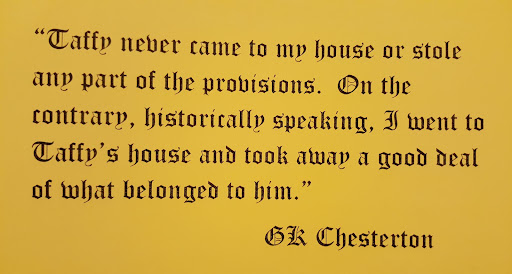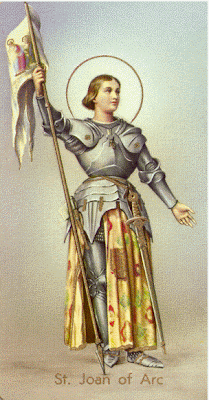You may or may not be aware of
this.
On 14th September - the feast of the Exaltation of the Holy Cross - Bishop Fellay, FSSPX, and a bunch of others are being received by Cardinal Levada of the CDF. Anything could happen - it could be good news, it could be bad news.
I propose a novena for a propitious and peaceful outcome to this meeting, one that will benefit the whole Church. I also propose that we take on some sort of extra penance for this intention, starting tomorrow.
This will be the novena, in Latin with English below it. The Latin takes a little over 2 minutes. The English takes a little over 1 minute 30 seconds. Not a big deal.
-----
LatinTo Pope St Pius X
Deus, qui ad tuendam catholicam fidem, et universa in Christo instauranda sanctum Pium, Summum Pontificem, caelesti sapientia et apostolica fortitudine replevisti; concede proitius; ut, ejus instituta et exempla sectantes, praemia consequamur aeterna. Per eumdem Dominum nostrum.
In Honour of the Holy Cross
Deus, qui unigeniti Filii tui pretioso sanguine, vivificare Crucis vexillum sanctificare voluisti: concede, quaesumus; eos, qui ejusdem sanctae Crucis gaudent honore, tua quoque ubique protectione gaudere. Per eumdem Dominum.
For Peace
Deus, a quo sancta desideria, recta consilia, et justa sunt opera: da servis tuis illam, quam mundus dare non potest, pacem; ut et corda nostra mandatis tuis dedita, et hostium sublata formidine, tempora sint tua protectione tranquilla. Per Dominum nostrum.
For people in authority and those under their charge
Omnipotens sempiterne Deus, qui facis mirabilia magna solus: praetende super famulos tuos, et super congregationes illis commissas, spiritum gratiae salutaris; et ut in veritate tibi complaceant, perpetuum eis rorem tuae benedictionis infunde. Per Dominum.
MemorareMemorare, O piisima Virgo Maria, non esse auditum a saecula, quemquam ad tua currentem praesidia, tua implorantem auxilia, tua petentem suffragia, esse derelictum. Ego tali animatus confidentia, ad te, Virgo Virginum, Mater, curro, ad te venio, coram te gemens peccator assisto. Noli, Mater Verbi, verba mea despicere; sed audi propitia et exaudi. Amen.
Through thy cross and passion - deliver us, O Lord.
Immaculate heart of Mary - pray for us.
Pope Saint Pius X - pray for us.
Saints Benedict and Joseph - pray for us.
Saint William - pray for us.
Saints Marcel, and Anthony of Padua - pray for us.
Saints Bernard, Richard and Alphonsus - pray for us.
All ye holy Angels and Archangels, all ye holy order of blessed Spirits - pray for us.
Fidelium animae per misericordiam Dei, requiescant in pace.
-----------
English:
To St Pius X
O God, who for the defence of the Catholic faith and to restore all things in Christ, filled saint Pius, the supreme Pontiff, with heavenly wisdom and apostolic strength; mercifully grant that following his teaching and example we may attain to our eternal reward. Through our same Lord.
In Honour of the Holy Cross
O God, who by the precious blood of thine only-begotten Son wast pleased to hallow the standard of the life-giving Cross: grant, we beseech thee, that those who rejoice in honouring that same holy Cross may likewise rejoice in thy protection, wheresoever they may be. Through the same Lord.
For Peace
O God, from whom all holy desires, all right counsels and all just works do proceed; give to thy servants that peace which the world cannot give; that our hearts may be disposed to obey thy commandments, and the fear of enemies being removed, our times, by thy protection, may be peaceful. Through our Lord.
For people in authority and those under their charge
Almighty and everlasting God, who alone workest great wonders, pour down upon thy servants and upon the flocks committed to their charge the spirit of thy saving grace, and that they may truly please thee, pour down upon them the continual dew of thy blessing. Through our Lord.
Memorare
Remember, O most gracious Virgin Mary, that never was it know that anyone who fled to thy protection, implored thy help or sought thy intercession was left unaided. Inspired with this confidence, I fly to thee, O Virgin of virgins, my Mother. To thee do I come; before thee I stand, sinful and sorrowful. O Mother of the Word Incarnate, despise not my petitions, but in thy mercy hear and answer me. Amen.
Through thy cross and passion - deliver us, O Lord.
Immaculate heart of Mary - pray for us.
Pope Saint Pius X - pray for us.
Saints Benedict and Joseph - pray for us.
Saint William - pray for us.
Saints Marcel, and Anthony of Padua - pray for us.
Saints Bernard, Richard and Alphonsus - pray for us.
All ye holy Angels and Archangels, all ye holy order of blessed Spirits - pray for us.
May the souls of all the faithful departed, through the mercy of God, rest in peace.
















